2014年春外研版九年级下 Module 9 English for you and me 全模块教案
文档属性
| 名称 | 2014年春外研版九年级下 Module 9 English for you and me 全模块教案 |
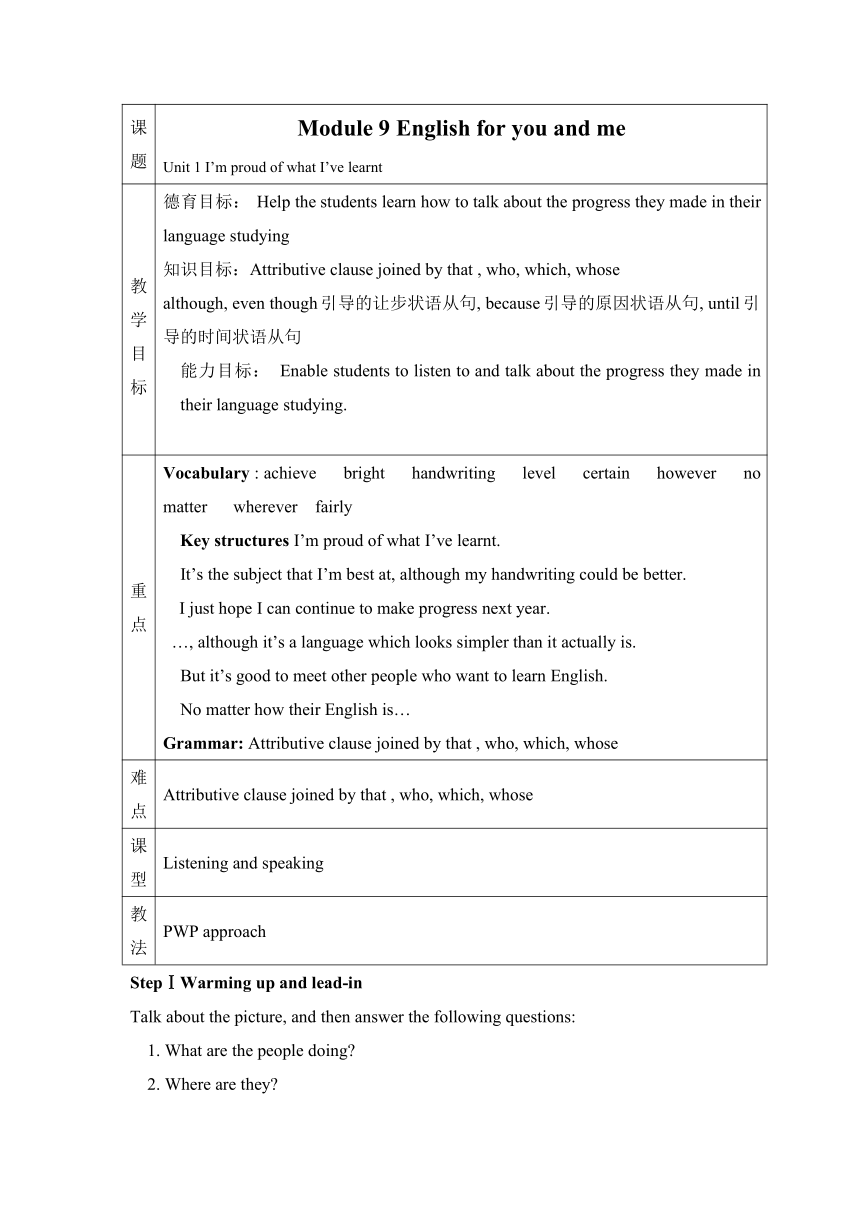
|
|
| 格式 | zip | ||
| 文件大小 | 80.0KB | ||
| 资源类型 | 教案 | ||
| 版本资源 | 外研版 | ||
| 科目 | 英语 | ||
| 更新时间 | 2014-02-04 09:15:55 | ||
图片预览

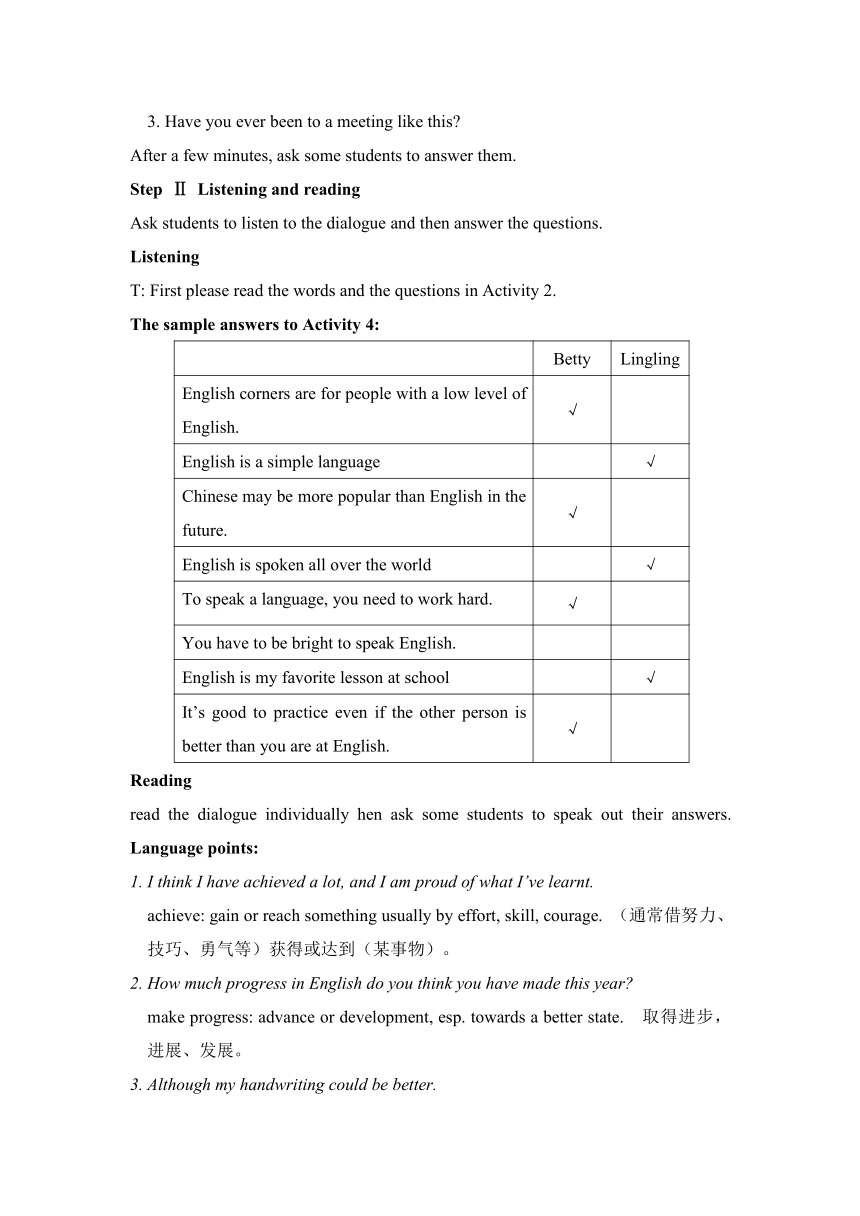
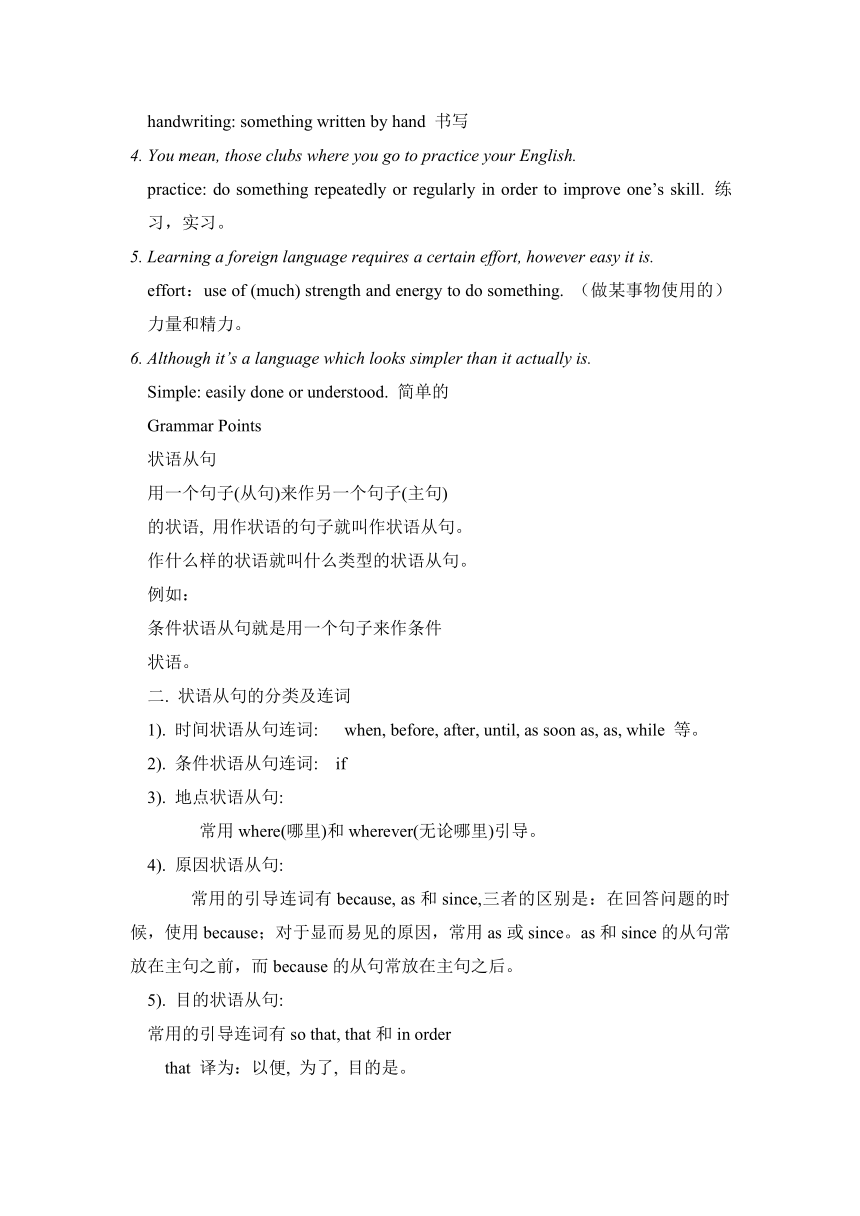
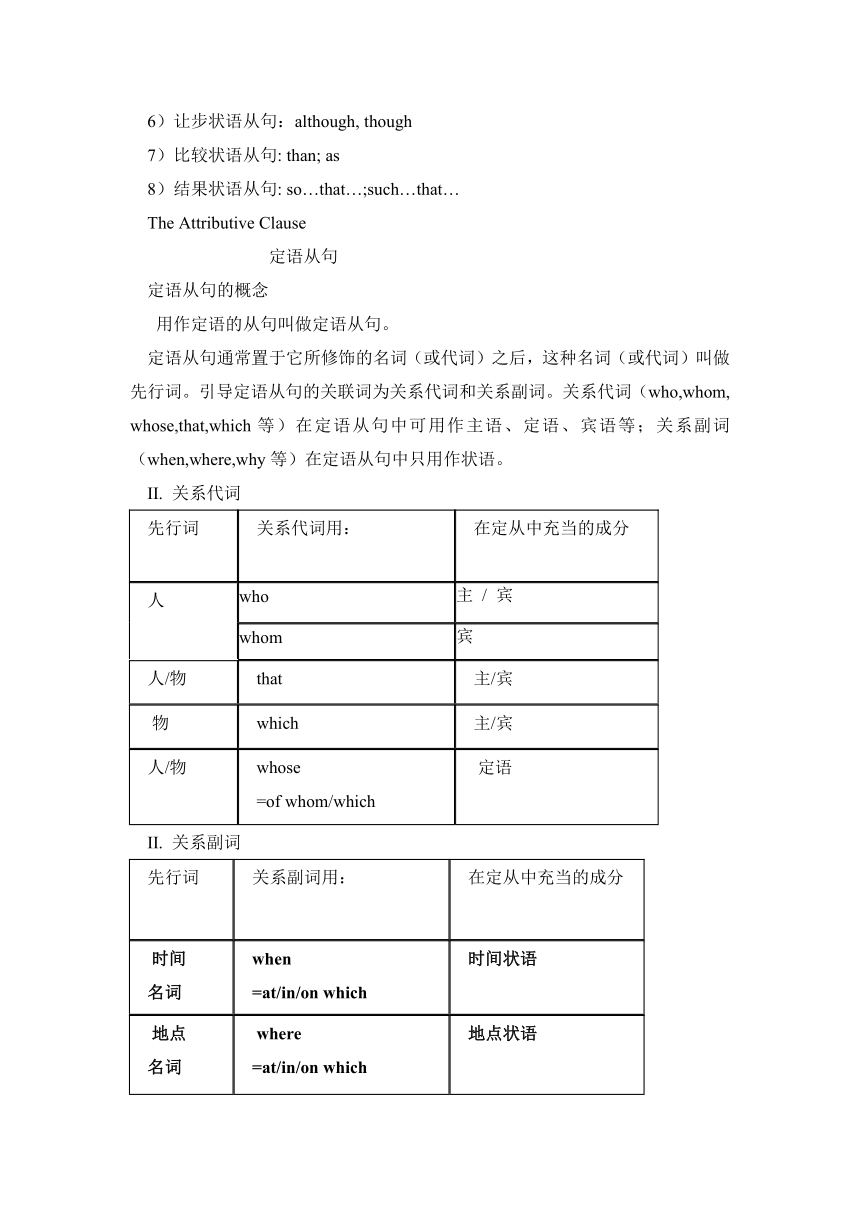
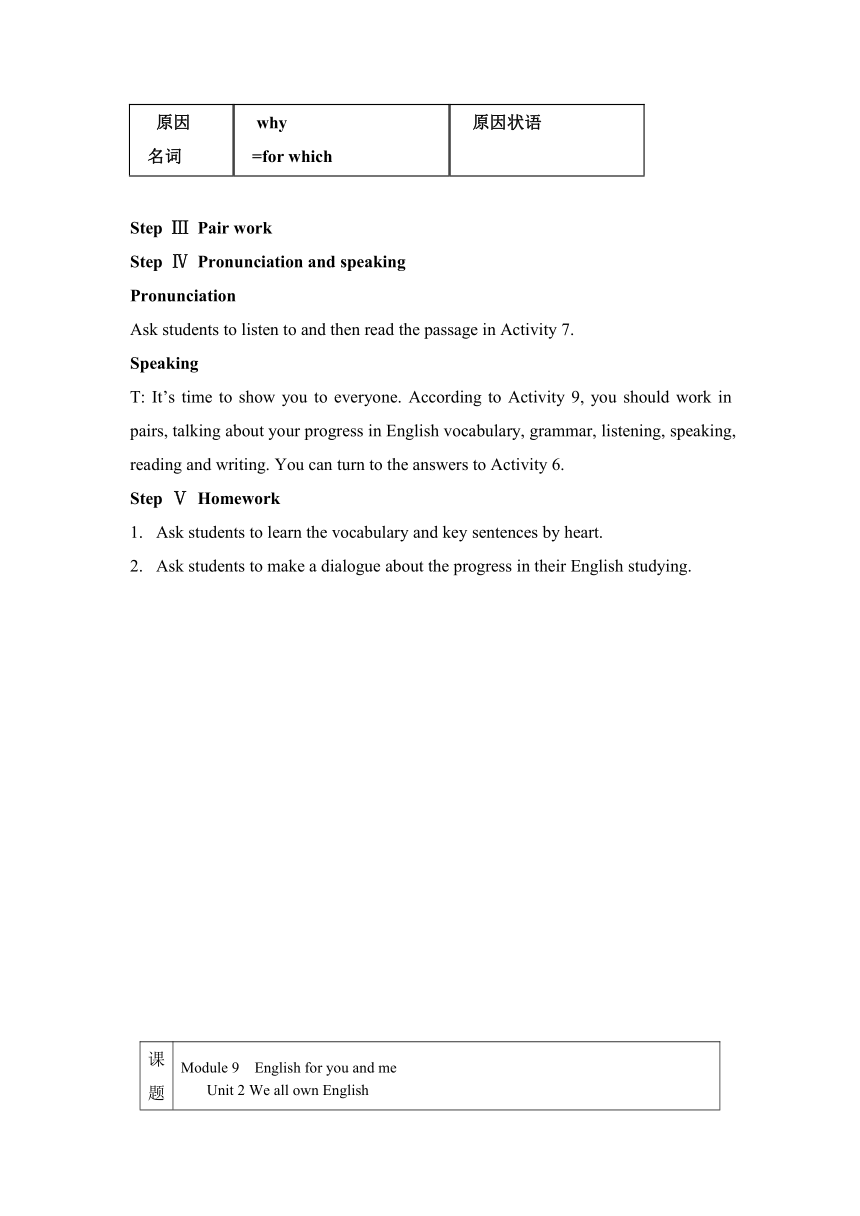
文档简介
课题 Module 9 English for you and me Unit 1 I’m proud of what I’ve learnt
教 学 目 标 德育目标: Help the students learn how to talk about the progress they made in their language studying知识目标:Attributive clause joined by that , who, which, whosealthough, even though引导的让步状语从句, because引导的原因状语从句, until引导的时间状语从句能力目标: Enable students to listen to and talk about the progress they made in their language studying.
重点 Vocabulary : achieve bright handwriting level certain however no matter wherever fairly Key structures I’m proud of what I’ve learnt.It’s the subject that I’m best at, although my handwriting could be better.I just hope I can continue to make progress next year. …, although it’s a language which looks simpler than it actually is.But it’s good to meet other people who want to learn English.No matter how their English is…Grammar: Attributive clause joined by that , who, which, whose
难点 Attributive clause joined by that , who, which, whose
课型 Listening and speaking
教法 PWP approach
StepⅠWarming up and lead-in
Talk about the picture, and then answer the following questions:
1. What are the people doing
2. Where are they
3. Have you ever been to a meeting like this
After a few minutes, ask some students to answer them.
Step Ⅱ Listening and reading
Ask students to listen to the dialogue and then answer the questions.
Listening
T: First please read the words and the questions in Activity 2.
The sample answers to Activity 4:
Betty Lingling
English corners are for people with a low level of English. √
English is a simple language √
Chinese may be more popular than English in the future. √
English is spoken all over the world √
To speak a language, you need to work hard. √
You have to be bright to speak English.
English is my favorite lesson at school √
It’s good to practice even if the other person is better than you are at English. √
Reading
read the dialogue individually hen ask some students to speak out their answers. Language points:
1. I think I have achieved a lot, and I am proud of what I’ve learnt.
achieve: gain or reach something usually by effort, skill, courage. (通常借努力、技巧、勇气等)获得或达到(某事物)。
2. How much progress in English do you think you have made this year
make progress: advance or development, esp. towards a better state. 取得进步,进展、发展。
3. Although my handwriting could be better.
handwriting: something written by hand 书写
4. You mean, those clubs where you go to practice your English.
practice: do something repeatedly or regularly in order to improve one’s skill. 练习,实习。
5. Learning a foreign language requires a certain effort, however easy it is.
effort:use of (much) strength and energy to do something. (做某事物使用的)力量和精力。
6. Although it’s a language which looks simpler than it actually is.
Simple: easily done or understood. 简单的
Grammar Points
状语从句
用一个句子(从句)来作另一个句子(主句)
的状语, 用作状语的句子就叫作状语从句。
作什么样的状语就叫什么类型的状语从句。
例如:
条件状语从句就是用一个句子来作条件
状语。
二. 状语从句的分类及连词
1). 时间状语从句连词: when, before, after, until, as soon as, as, while 等。
2). 条件状语从句连词: if
3). 地点状语从句:
常用where(哪里)和wherever(无论哪里)引导。
4). 原因状语从句:
常用的引导连词有because, as和since,三者的区别是:在回答问题的时候,使用because;对于显而易见的原因,常用as或since。as和since的从句常放在主句之前,而because的从句常放在主句之后。
5). 目的状语从句:
常用的引导连词有so that, that和in order
that 译为:以便, 为了, 目的是。
6)让步状语从句:although, though
7)比较状语从句: than; as
8)结果状语从句: so…that…;such…that…
The Attributive Clause
定语从句
定语从句的概念
用作定语的从句叫做定语从句。
定语从句通常置于它所修饰的名词(或代词)之后,这种名词(或代词)叫做先行词。引导定语从句的关联词为关系代词和关系副词。关系代词(who,whom, whose,that,which等)在定语从句中可用作主语、定语、宾语等;关系副词(when,where,why等)在定语从句中只用作状语。
II. 关系代词
先行词 关系代词用: 在定从中充当的成分
人 who 主 / 宾
whom 宾
人/物 that 主/宾
物 which 主/宾
人/物 whose=of whom/which 定语
II. 关系副词
先行词 关系副词用: 在定从中充当的成分
时间名词 when =at/in/on which 时间状语
地点名词 where =at/in/on which 地点状语
原因名词 why =for which 原因状语
Step Ⅲ Pair work
Step Ⅳ Pronunciation and speaking
Pronunciation
Ask students to listen to and then read the passage in Activity 7.
Speaking
T: It’s time to show you to everyone. According to Activity 9, you should work in pairs, talking about your progress in English vocabulary, grammar, listening, speaking, reading and writing. You can turn to the answers to Activity 6.
Step Ⅴ Homework
Ask students to learn the vocabulary and key sentences by heart.
Ask students to make a dialogue about the progress in their English studying.
课题 Module 9 English for you and meUnit 2 We all own English
教 学 目 标 德育目标:To know the importance of learning English 知识目标: a. Words & phrases生词和短语own, everyday, tourism, quarter, recent, typhoon, importance, Indian, in place ofb. Key sentences重点句子 Until English became important in the 20th century, people who had any education spoke French. More and more schools in Europe are teaching Chinese as a foreign language, in place of other European languages. Even if there are differences in grammar, vocabulary, pronunciation and spelling, we all belong to the international English speaking world.能力目标: To understand the passage and write a composition called “The future of Chinese”.To learn how to analyze the passage in this unit and write a composition about the future of Chinese.
重点 Learn to write a composition about the future of Chinese.
难点 Learn to write a composition about the future of Chinese.
课型 Reading and writing
教法 Listening, speaking, reading and writing.
Teaching procedures and ways教学过程
Step Ⅰ Revision and lead-in
Review what the students learned last period and introduce what will be learned in this period.
Revision: let’s play a game. You are divided into four groups. You have chances to say the progress you have made in English vocabulary, grammar, listening, speaking, reading and writing. When your group’s answer is right, your group will get a red star. The group which has the most stars will be the winner. Now, Start! Please do it as quickly as possible.
Lead-in
The teacher shows a map to the students:
Look at the map.
What are the names of these countries Does anyone know the names of the countries
Can you tell me what language has the largest number of speakers
StepⅡReading
Please look at the pictures on Page 74 and then find the questions in Activity 1. First, look at the pictures and then tell me where they are and what languages you can see
read the passage carefully and answer the questions in Activity 2.
check the answers.
Please work in pairs and talk about your answers to the questions.
Step Ⅲ Writing
Ask students to write a composition about The Future of Chinese
The sample:
Chinese is one of working languages in the United Nations. Not only people living inside China, but also many Chinese outside China speak it. You will find large or small groups of Chinese people living in almost every country in the world. They are living and working there. Chinese has the largest number of speakers in the world. However, we have entered a period in history when children are all learning beginner or higher level English. But looking into the future, the number of learners may grow smaller almost as quickly as it increased. Many language learners are expressing an interest in learning Chinese.
Step ⅣHomework
1. Ask students to learn the key sentences by heart
2. Retell the passage.
课题 Module 9 English for you and me Unit 3 Language practice
教 学 目 标 德育目标:To know about the importance of learning English知识目标:a. Words & phrases生词和短语speaker period expressb. Key sentences重点句子Lao She is the author who…Even though you don’t understand much, you should…However, we have entered a period in world history when children are all learning beginner or higher level English.能力目标:Enable students to use attributive clause and other adverbial clauses to say something learn how to choose the right conjunctions in different clauses.
重点 Learn to talk about giving advice and learn about the future of the English
难点 Learn to talk about giving advice and learn about the future of the English
课型 Revision and application
教法 Formal and interactive practices
Teaching procedures and ways教学过程与方式
StepⅠRevision and lead-in
1. Ask some students to retell the passage “Who owns English” to have a revision.
2. Introduce attributive clause and other adverbial clauses to students.
Step Ⅱ Grammar Practice
Do Activity 1: Read the words in the box and the following example carefully. Then you join the sentences with the words in the box according to the example.
check our answers.
Activity 2: Complete the sentences so that they are true for you.
Ask students to practice the attributive clause and other adverbial clauses using the given conjunction words.
let the students exchange their ideas.
let’s go on with Activity 3.
Check the answers.
Step Ⅲ Listening and speaking
Listening
Let students do some listening comprehension.
listen to an advertisement and say what it is for.
Then check the answer.
listen to the passage again and then answer the questions. Please read the questions as quickly as you can.
listen carefully, and try your best to grasp the main idea.
After listening, talk about them and check the answers.
Speaking
a. Ask students to read the reports and then discuss the following questions in pairs in Activity 4 on Page 77.
b. Then go on with Activity 5: Complete the sentences and give advice.
Exchange their ideas.
Step Ⅳ Reading
1. Ask students to read the passage about the development of English.
Please read the passage carefully and finish the following choices on Page 78.
Then check the answers.
Read the passage “Invented languages” in “Around the world”.
Please read the passage and fill in the blanks, and the first letters have been given.
People have been i______ languages since the 17th century in the hope that a world language will bring world peace. One of them called E_____ was invented by a P____ man Zamenhof. The language is b______ on Latin, German and Greek vocabulary. The letter of the language has the same s_____ and the s_____ grammar rules. But because many people have learned it as a first language, it is u______ to become a new world language after all.
Step Ⅴ Module task
The tips for learning English:
Improve your English grammar
﹡Use self-study grammar books ( http: / / www.21cnjy.com" \o "欢迎登陆21世纪教育网 ).
﹡Learn the different tenses ( http: / / www.21cnjy.com" \o "欢迎登陆21世纪教育网 ). Learn by heart a simple example sentence using each tense.
﹡Do online exercises ( http: / / www.21cnjy.com" \o "欢迎登陆21世纪教育网 ). Keep a note of how you did and go back in a few weeks to see how you have improved.
Improve your vocabulary
﹡Use English notebooks
﹡Use flash cards
Improve your listening
﹡Watch English Films
﹡Listen while reading is a good idea.
﹡Keep up to date with current events and watch an English-language news station,
such as BBC World. Watch news reports on events you are already aware of.
﹡Find out how to switch languages on your TV. If you have digital or satellite TV there are several channels that broadcast in multiple languages. Eurosport is one and Euronews is another, you should be able to set these to the English language.
Improve your speaking
﹡Speak clearly, concisely and use simple vocabulary.
﹡Avoid idioms and slang
Improve your reading
﹡Make a habit of reading regularly.
﹡Read as many English books, newspapers and magazines as you can find.
﹡Find an author you like ( http: / / www.21cnjy.com" \o "欢迎登陆21世纪教育网 ) and read all their books. By doing this you will get used to the style of a particular author and the typical vocabulary and grammar they use. As you read more of his/her books you will find it easier and easier.
﹡If you have a local library find out if they stock English books or if they have bilingual editions of English classics. Or ask them to stock English translations of books you are already familiar with.
﹡Try reading things more than once. Read something and then read it again a few weeks/months later. You should find your understanding has improved.
Improve your writing
﹡Write frequently, in a wide range of formal and informal situations.
﹡Get the most out of your dictionary by understanding how to use it correctly.
﹡Copy out short passages of English text from newspapers, magazines or books.
﹡Try dictation exercises ( http: / / www.21cnjy.com" \o "欢迎登陆21世纪教育网 ). You can do this online or get friends to read out text for you to write and then check your writing - concentrate on spelling and punctuation.
﹡Use a blog to create a diary about your life. Write it in English and if you have a thick skin, ask for feedback.
﹡Be careful about using abbreviations ( http: / / www.21cnjy.com" \o "欢迎登陆21世纪教育网 ) when writing on forums and in chat rooms, they are fun and quick, but can cause bad habits to form.
﹡If you are using a computer, use an English spell checker (but don’t rely on it). There are spell checkers available for Google and Firebox browsers too.
StepⅥ Homework
1. List more tips for learning English.
2. Review what have been learned in this module
教 学 目 标 德育目标: Help the students learn how to talk about the progress they made in their language studying知识目标:Attributive clause joined by that , who, which, whosealthough, even though引导的让步状语从句, because引导的原因状语从句, until引导的时间状语从句能力目标: Enable students to listen to and talk about the progress they made in their language studying.
重点 Vocabulary : achieve bright handwriting level certain however no matter wherever fairly Key structures I’m proud of what I’ve learnt.It’s the subject that I’m best at, although my handwriting could be better.I just hope I can continue to make progress next year. …, although it’s a language which looks simpler than it actually is.But it’s good to meet other people who want to learn English.No matter how their English is…Grammar: Attributive clause joined by that , who, which, whose
难点 Attributive clause joined by that , who, which, whose
课型 Listening and speaking
教法 PWP approach
StepⅠWarming up and lead-in
Talk about the picture, and then answer the following questions:
1. What are the people doing
2. Where are they
3. Have you ever been to a meeting like this
After a few minutes, ask some students to answer them.
Step Ⅱ Listening and reading
Ask students to listen to the dialogue and then answer the questions.
Listening
T: First please read the words and the questions in Activity 2.
The sample answers to Activity 4:
Betty Lingling
English corners are for people with a low level of English. √
English is a simple language √
Chinese may be more popular than English in the future. √
English is spoken all over the world √
To speak a language, you need to work hard. √
You have to be bright to speak English.
English is my favorite lesson at school √
It’s good to practice even if the other person is better than you are at English. √
Reading
read the dialogue individually hen ask some students to speak out their answers. Language points:
1. I think I have achieved a lot, and I am proud of what I’ve learnt.
achieve: gain or reach something usually by effort, skill, courage. (通常借努力、技巧、勇气等)获得或达到(某事物)。
2. How much progress in English do you think you have made this year
make progress: advance or development, esp. towards a better state. 取得进步,进展、发展。
3. Although my handwriting could be better.
handwriting: something written by hand 书写
4. You mean, those clubs where you go to practice your English.
practice: do something repeatedly or regularly in order to improve one’s skill. 练习,实习。
5. Learning a foreign language requires a certain effort, however easy it is.
effort:use of (much) strength and energy to do something. (做某事物使用的)力量和精力。
6. Although it’s a language which looks simpler than it actually is.
Simple: easily done or understood. 简单的
Grammar Points
状语从句
用一个句子(从句)来作另一个句子(主句)
的状语, 用作状语的句子就叫作状语从句。
作什么样的状语就叫什么类型的状语从句。
例如:
条件状语从句就是用一个句子来作条件
状语。
二. 状语从句的分类及连词
1). 时间状语从句连词: when, before, after, until, as soon as, as, while 等。
2). 条件状语从句连词: if
3). 地点状语从句:
常用where(哪里)和wherever(无论哪里)引导。
4). 原因状语从句:
常用的引导连词有because, as和since,三者的区别是:在回答问题的时候,使用because;对于显而易见的原因,常用as或since。as和since的从句常放在主句之前,而because的从句常放在主句之后。
5). 目的状语从句:
常用的引导连词有so that, that和in order
that 译为:以便, 为了, 目的是。
6)让步状语从句:although, though
7)比较状语从句: than; as
8)结果状语从句: so…that…;such…that…
The Attributive Clause
定语从句
定语从句的概念
用作定语的从句叫做定语从句。
定语从句通常置于它所修饰的名词(或代词)之后,这种名词(或代词)叫做先行词。引导定语从句的关联词为关系代词和关系副词。关系代词(who,whom, whose,that,which等)在定语从句中可用作主语、定语、宾语等;关系副词(when,where,why等)在定语从句中只用作状语。
II. 关系代词
先行词 关系代词用: 在定从中充当的成分
人 who 主 / 宾
whom 宾
人/物 that 主/宾
物 which 主/宾
人/物 whose=of whom/which 定语
II. 关系副词
先行词 关系副词用: 在定从中充当的成分
时间名词 when =at/in/on which 时间状语
地点名词 where =at/in/on which 地点状语
原因名词 why =for which 原因状语
Step Ⅲ Pair work
Step Ⅳ Pronunciation and speaking
Pronunciation
Ask students to listen to and then read the passage in Activity 7.
Speaking
T: It’s time to show you to everyone. According to Activity 9, you should work in pairs, talking about your progress in English vocabulary, grammar, listening, speaking, reading and writing. You can turn to the answers to Activity 6.
Step Ⅴ Homework
Ask students to learn the vocabulary and key sentences by heart.
Ask students to make a dialogue about the progress in their English studying.
课题 Module 9 English for you and meUnit 2 We all own English
教 学 目 标 德育目标:To know the importance of learning English 知识目标: a. Words & phrases生词和短语own, everyday, tourism, quarter, recent, typhoon, importance, Indian, in place ofb. Key sentences重点句子 Until English became important in the 20th century, people who had any education spoke French. More and more schools in Europe are teaching Chinese as a foreign language, in place of other European languages. Even if there are differences in grammar, vocabulary, pronunciation and spelling, we all belong to the international English speaking world.能力目标: To understand the passage and write a composition called “The future of Chinese”.To learn how to analyze the passage in this unit and write a composition about the future of Chinese.
重点 Learn to write a composition about the future of Chinese.
难点 Learn to write a composition about the future of Chinese.
课型 Reading and writing
教法 Listening, speaking, reading and writing.
Teaching procedures and ways教学过程
Step Ⅰ Revision and lead-in
Review what the students learned last period and introduce what will be learned in this period.
Revision: let’s play a game. You are divided into four groups. You have chances to say the progress you have made in English vocabulary, grammar, listening, speaking, reading and writing. When your group’s answer is right, your group will get a red star. The group which has the most stars will be the winner. Now, Start! Please do it as quickly as possible.
Lead-in
The teacher shows a map to the students:
Look at the map.
What are the names of these countries Does anyone know the names of the countries
Can you tell me what language has the largest number of speakers
StepⅡReading
Please look at the pictures on Page 74 and then find the questions in Activity 1. First, look at the pictures and then tell me where they are and what languages you can see
read the passage carefully and answer the questions in Activity 2.
check the answers.
Please work in pairs and talk about your answers to the questions.
Step Ⅲ Writing
Ask students to write a composition about The Future of Chinese
The sample:
Chinese is one of working languages in the United Nations. Not only people living inside China, but also many Chinese outside China speak it. You will find large or small groups of Chinese people living in almost every country in the world. They are living and working there. Chinese has the largest number of speakers in the world. However, we have entered a period in history when children are all learning beginner or higher level English. But looking into the future, the number of learners may grow smaller almost as quickly as it increased. Many language learners are expressing an interest in learning Chinese.
Step ⅣHomework
1. Ask students to learn the key sentences by heart
2. Retell the passage.
课题 Module 9 English for you and me Unit 3 Language practice
教 学 目 标 德育目标:To know about the importance of learning English知识目标:a. Words & phrases生词和短语speaker period expressb. Key sentences重点句子Lao She is the author who…Even though you don’t understand much, you should…However, we have entered a period in world history when children are all learning beginner or higher level English.能力目标:Enable students to use attributive clause and other adverbial clauses to say something learn how to choose the right conjunctions in different clauses.
重点 Learn to talk about giving advice and learn about the future of the English
难点 Learn to talk about giving advice and learn about the future of the English
课型 Revision and application
教法 Formal and interactive practices
Teaching procedures and ways教学过程与方式
StepⅠRevision and lead-in
1. Ask some students to retell the passage “Who owns English” to have a revision.
2. Introduce attributive clause and other adverbial clauses to students.
Step Ⅱ Grammar Practice
Do Activity 1: Read the words in the box and the following example carefully. Then you join the sentences with the words in the box according to the example.
check our answers.
Activity 2: Complete the sentences so that they are true for you.
Ask students to practice the attributive clause and other adverbial clauses using the given conjunction words.
let the students exchange their ideas.
let’s go on with Activity 3.
Check the answers.
Step Ⅲ Listening and speaking
Listening
Let students do some listening comprehension.
listen to an advertisement and say what it is for.
Then check the answer.
listen to the passage again and then answer the questions. Please read the questions as quickly as you can.
listen carefully, and try your best to grasp the main idea.
After listening, talk about them and check the answers.
Speaking
a. Ask students to read the reports and then discuss the following questions in pairs in Activity 4 on Page 77.
b. Then go on with Activity 5: Complete the sentences and give advice.
Exchange their ideas.
Step Ⅳ Reading
1. Ask students to read the passage about the development of English.
Please read the passage carefully and finish the following choices on Page 78.
Then check the answers.
Read the passage “Invented languages” in “Around the world”.
Please read the passage and fill in the blanks, and the first letters have been given.
People have been i______ languages since the 17th century in the hope that a world language will bring world peace. One of them called E_____ was invented by a P____ man Zamenhof. The language is b______ on Latin, German and Greek vocabulary. The letter of the language has the same s_____ and the s_____ grammar rules. But because many people have learned it as a first language, it is u______ to become a new world language after all.
Step Ⅴ Module task
The tips for learning English:
Improve your English grammar
﹡Use self-study grammar books ( http: / / www.21cnjy.com" \o "欢迎登陆21世纪教育网 ).
﹡Learn the different tenses ( http: / / www.21cnjy.com" \o "欢迎登陆21世纪教育网 ). Learn by heart a simple example sentence using each tense.
﹡Do online exercises ( http: / / www.21cnjy.com" \o "欢迎登陆21世纪教育网 ). Keep a note of how you did and go back in a few weeks to see how you have improved.
Improve your vocabulary
﹡Use English notebooks
﹡Use flash cards
Improve your listening
﹡Watch English Films
﹡Listen while reading is a good idea.
﹡Keep up to date with current events and watch an English-language news station,
such as BBC World. Watch news reports on events you are already aware of.
﹡Find out how to switch languages on your TV. If you have digital or satellite TV there are several channels that broadcast in multiple languages. Eurosport is one and Euronews is another, you should be able to set these to the English language.
Improve your speaking
﹡Speak clearly, concisely and use simple vocabulary.
﹡Avoid idioms and slang
Improve your reading
﹡Make a habit of reading regularly.
﹡Read as many English books, newspapers and magazines as you can find.
﹡Find an author you like ( http: / / www.21cnjy.com" \o "欢迎登陆21世纪教育网 ) and read all their books. By doing this you will get used to the style of a particular author and the typical vocabulary and grammar they use. As you read more of his/her books you will find it easier and easier.
﹡If you have a local library find out if they stock English books or if they have bilingual editions of English classics. Or ask them to stock English translations of books you are already familiar with.
﹡Try reading things more than once. Read something and then read it again a few weeks/months later. You should find your understanding has improved.
Improve your writing
﹡Write frequently, in a wide range of formal and informal situations.
﹡Get the most out of your dictionary by understanding how to use it correctly.
﹡Copy out short passages of English text from newspapers, magazines or books.
﹡Try dictation exercises ( http: / / www.21cnjy.com" \o "欢迎登陆21世纪教育网 ). You can do this online or get friends to read out text for you to write and then check your writing - concentrate on spelling and punctuation.
﹡Use a blog to create a diary about your life. Write it in English and if you have a thick skin, ask for feedback.
﹡Be careful about using abbreviations ( http: / / www.21cnjy.com" \o "欢迎登陆21世纪教育网 ) when writing on forums and in chat rooms, they are fun and quick, but can cause bad habits to form.
﹡If you are using a computer, use an English spell checker (but don’t rely on it). There are spell checkers available for Google and Firebox browsers too.
StepⅥ Homework
1. List more tips for learning English.
2. Review what have been learned in this module
同课章节目录
- Module 1 Travel
- Unit 1 We toured the city by bus and by taxi
- Unit 2 It's a long story.
- Unit 3 Language in use
- Module 2 Education
- Unit 1 They don't sit in rows.
- Unit 2 What do I like best about school?
- Unit 3 Language in use
- Module 3 Life now and then
- Unit 1 They sometimes work harder.
- Unit 2 I think life is better today.
- Unit 3 Language in use.
- Module 4 Rules and suggestions
- Unit 1 You must be careful of falling stones.
- Unit 2 we must keep the camp clean.
- Unit 3 Language in use.
- Revison A
- Module 5 Look after yourself
- Unit 1 We'd better get you to hospital.
- Unit 2 Get off the sofa!
- Unit 3 Language in use.
- Module 6 Eating togethe
- Unit 1 When is the school-leavers' party?
- Unit 2 Knives and forks are used for most Western
- Unit 3 Language in use
- Module 7 English for you and me
- Unit 1 Have you ever been to an English corner?
- Unit 2 We all own English.
- Unit 3 Language in use
- Module 8 My future life
- Unit 1 Here's to our friendship and the future
- Unit 2 I know that you will be better at maths.
- Unit 3 Language in use
- Revison B
